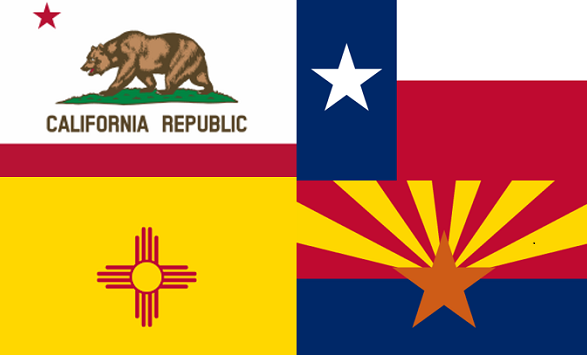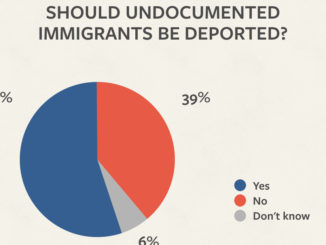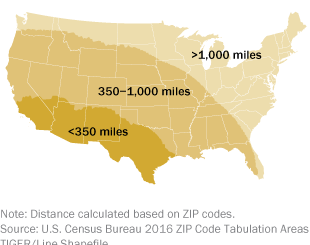
by Ruben Pacheco
In President Trump’s era of aggressive immigration enforcement, a power struggle between state, tribal, and federal authorities is unfolding before our eyes. So-called sanctuary-city policies have been employed by local jurisdictions to ensure that immigrants are afforded constitutional protections. Federal authorities have retaliated by increasing immigrant roundups and suing immigrant-friendly states.
Federalism offers a glimmer of hope for resisting Trump’s atrocious immigration enforcement policies. State and tribal governments should appeal to the principles of our federalist system to challenge ICE and Border Patrol’s overzealous policing tactics.
One high profile example unfolded in February when Oakland Mayor Libby Schaaf issued a warning to Oakland’s immigrant community about ICE’s plans to conduct raids across northern California. She emphasized Oakland Unified School District’s protocols that protect students and families and the state’s recently passed Assembly Bill 450, which seeks to protect immigrant rights in the workplace.
The president responded by calling Schaaf’s action a “disgrace.” Meanwhile, Attorney General Jeff Sessions falsely claimed that approximately 800 undocumented immigrants escaped arrest due to Schaaf’s warnings. Session’s falsehood led to the eventual resignation of ICE’s San Francisco spokesman, James Schwab, who said, “I quit because I didn’t want to perpetuate misleading facts… I asked them to change the information. I told them that the information was wrong, they asked me to deflect, and I didn’t agree with that.”
The Trump administration is currently suing California over three 2017 policies related to ICE operations in California and the agency’s interaction with local law enforcement. These policies include laws that protect California’s right to limit the use of state and local resources to enforce immigration laws and allow state oversight of immigrant detention facilities. Another policy curbs ICE’s ability to conduct surprise workplace raids by requiring a subpoena or court order, and by granting immigrant workers other workplace protections.
A separate showdown is happening on the New Mexico-Mexico border where the State Land Commissioner, Aubrey Dunn, fenced off a one mile segment of state trust land. The parcel is frequently traversed by Customs and Border Protection (CBP), and in early March, Dunn placed “No Trespassing” signs there after sending a letter to the Department of Homeland Security (DHS). Dunn wrote:
I launched an investigation which revealed that the federal government has installed a border wall, infrastructure, and roads on state lands without the state authorization and without compensation to the state trust.
Dunn contends that the federal government owes New Mexico fees that would provide additional funding for its public schools via the state land trust. His actions are inspired by recent legislation proposed by the New Mexico legislature to block the construction of Trump’s border wall on state land.
The battle on the border is not new for American Indian communities within the borderlands. In Arizona, tribal-federal relations have been souring since 9/11 due to militarized surveillance on tribal lands. The people of the Tohono O’odham Nation are restricted from traveling freely within their reservation boundaries because of Border Patrol checkpoints. The reservation straddles the Arizona-Mexico border, with half of the tribe’s historic boundaries in current day Mexico. The Border Patrol’s occupation of the Tohono O’odham’s traditional homeland includes 24-hour border surveillance and the use of high-powered lights, drones, and Black Hawk helicopters.
When asked about a border wall, Vice Chairman of the Tohono O’odham Nation, Verlon Jose, responded “over my dead body.” The Tohono O’odham is not the only tribe dealing with federal immigration enforcement: According to a 2012 Amnesty International report, there are 26 federally recognized tribes within the borderlands, as well as other unrecognized tribes.
Federalism is as a system of governance with multiple jurisdictions, each of which has some degree of autonomy. The federalist system of the United States, in particular, has built-in mechanisms to safeguard liberties. These include checks and balances that can shield minority groups from oppressive majorities. As the Cato Institute’s Ilya Somin wrote in 2014,
Federalism can promote liberty simply by reducing the number of people affected by harmful government policies, relative to what would be the case if the same policy were adopted nationwide by the central government.
It is yet to be seen how appeals to federal, state, and tribal authorities will be adjudicated in the courts. But in a political landscape of fear, anger, and uncertainty, federalism offers a path for states and tribes to challenge aggressive federal immigration enforcement.
Ruben Pacheco is an Advocate at Young Voices and policy analyst from Albuquerque, NM. He has worked at think tanks in Washington D.C., Albuquerque, and Austin. Follow him on Twitter at @RPachec4.



